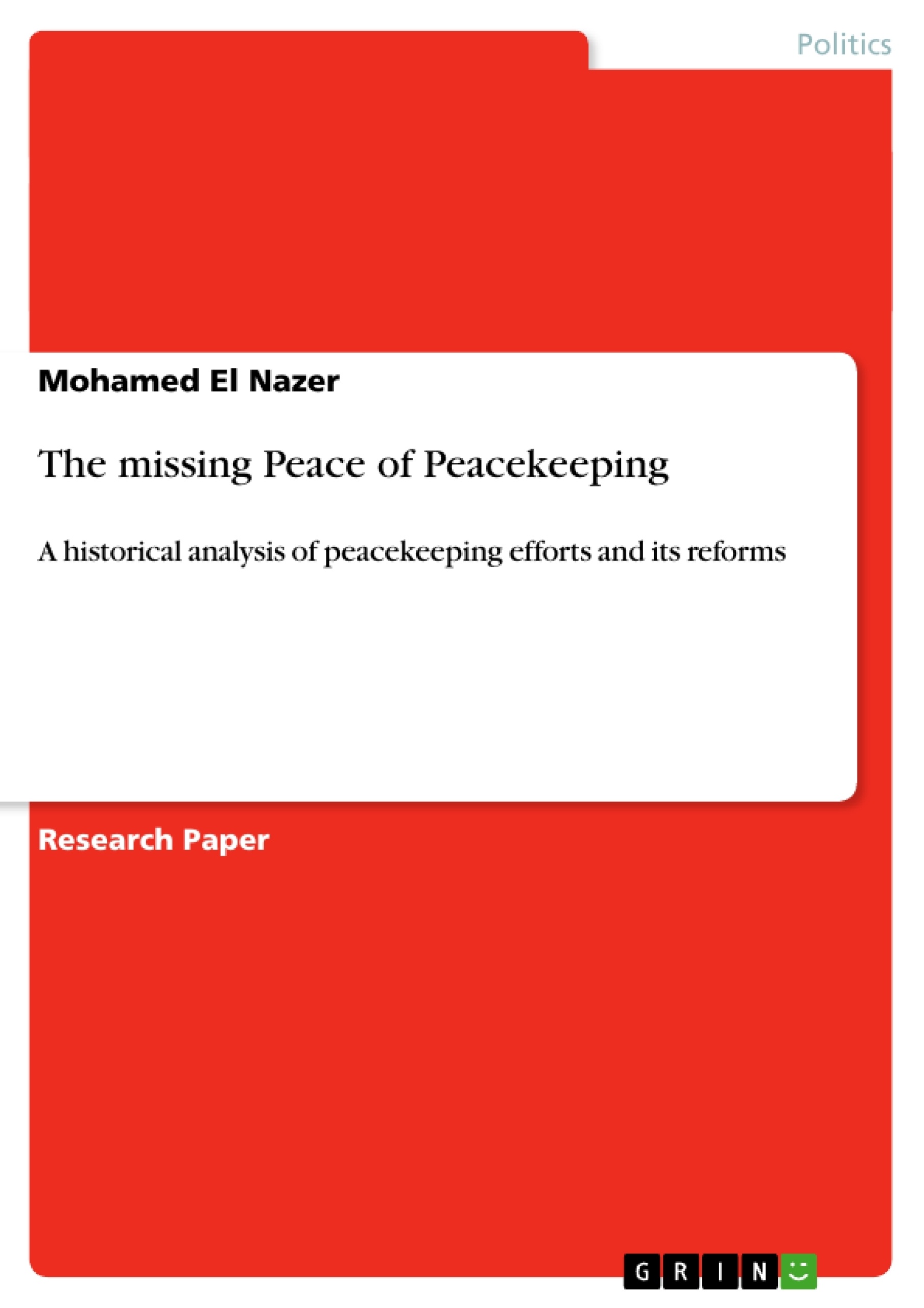Excerpt
THE MISSING PEACE OF PEACEKEEPING:
A historical analysis of peacekeeping efforts and its reforms
The early effort for the United Nations to start the Peacekeeping mission was in 1948, when the United Nations authorized the deployment of troops in the Middle East to maintain peace and security. The mission’s intent was to supervise on the Armistice agreement made by Israel and Arab countries during the Arab Israeli conflict. It was crucial time for the United Nations to deploy its military personnel for several reasons. It was the second stage of the Palestinian war, preceded by domestic unrest and civil war between the Palestinians and the Jewish people as a result of the UN 1947 partition plan. A coalition between Arab states supporting the Palestinian people turned an intra-territorial war between ethnic groups to a war between sovereign states. The war ended with an agreement of a new independent state of Israel signed by Egypt, Syria, Lebanon and Jordan. The UN supervised on the agreement maintaining the agreed upon borders calling it the Green Line or the so-called 1949 Armistice Agreement. The UN was successful in only maintain these lines until the 1967 war. The second operation for the UN was the India-Pakistan war, only a year after its first operation in 1949. It was inevitable for the United Nations to take a stand to implement a ceasefire, as the whole peacekeeping initiative at that time was only limited to that. The Indi-Pakistan war, which is also known as the First Kashmir war, was a fight between the two states of India and Pakistan over Kashmir and Jammu. It started off when Pakistan claimed that there is an organized rebellion in Kashmir that needs to be suppressed. The leader of Kashmir and Jammu signed the Instrument of Accession treaty to the Indian Union, eventually causing a breach of Indian sovereignty, turning the conflict into a war between India and Pakistan. It was also a very important decision at that time for the New Delhi government to take the conflict to the UN and to have some kind of dialog. The third operation of the United Nations is considered one of the most challenging operations, the Korean War. With the help on UN peacekeeping troops, the North Korean army had to pull back out of the southern territories of Korea, and the Chinese army intervened pushing the peacekeeping troops to the 38th parallel. A ceasefire agreement was held with the help of the UN in 1953 and remained in the mandate until 1967 when the United States took over the initiative. The three operations discussed basically demonstrate the early efforts of peacekeeping in the United Nation’s history. However, peacekeeping operations became more dynamic, complex, and rather more intervening. The UN discourse divides its peacekeeping history into three periods, the early years from 1948 to the late 80’s and end of the Cold War. The second period is the 90’s and the post-Cold War period, which is considered a deadly period of the UN peacekeeping history. The third era is the reform era of peacekeeping when many internationalists came up to change and reform the operations and purpose of the initiative.
As discussed in the previous paragraphs, the first UN peacekeeping operations where limited in nature, for its main purpose was only to achieve cease-fire agreements. As years went by, UN Peacekeeping operations became more dynamic, greater responsibility and obligation. The total number of Peacekeeping operations is 63, 17 of them are still ongoing. The number of Peacekeeping operations in the 90’s alone exceeds the number of operations in the previous 45 years (“un.org”). To be exactly accurate with the UN literature, the post-Cold War era is named as the post-Cold War Surge, which explains the extreme number of operations during that decade. The decade started off with specific goals in a very hopeful time. Before the end of the Cold War, it was very difficult for the United Nations to maintain strong peacekeeping efforts for the world was divided into two ideological blocs. However, after the fall of communism there was a global consensus that the new independent Eastern European states who belonged to the USSR would race for democracy and a change in political ideology. But this was not the case, and a race of ethnic conflict and strife took off.
[...]
- Quote paper
- Mohamed El Nazer (Author), 2012, The missing Peace of Peacekeeping, Munich, GRIN Verlag, https://www.grin.com/document/208045
Publish now - it's free






















Comments